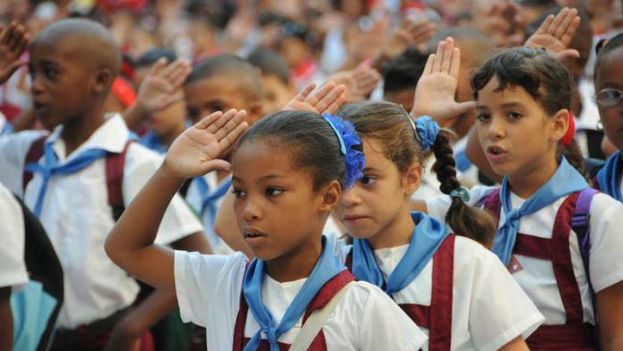
![]() 14ymedio, Yoani Sanchez, Havana, 8 October 2015 — The ceremony is solemn. The national anthem echoes from the loudspeakers and an adult with a serious face ties the blue scarf around the student’s neck. Little has changed since my childhood, when that initiation turned us into members of the youngest mass organization in Cuba. A piece of cloth and a slogan sealed the commitment: “Pioneers for Communism, we will be like Che!”
14ymedio, Yoani Sanchez, Havana, 8 October 2015 — The ceremony is solemn. The national anthem echoes from the loudspeakers and an adult with a serious face ties the blue scarf around the student’s neck. Little has changed since my childhood, when that initiation turned us into members of the youngest mass organization in Cuba. A piece of cloth and a slogan sealed the commitment: “Pioneers for Communism, we will be like Che!”
These days the initiators of the Cuban Pioneers Union, renamed as the José Martí Pioneers Organization (OPJM) in 1977, are applying for retirement at their workplaces. They no longer have that glimmer of hope one saw in their eyes long ago, nor do they even speak about “communism,” a concept that the Party in power itself has forgotten to mention in the Guidelines issued by its last Congress.
Meanwhile, Ernesto Guevara, who inspired the motto of the Pioneer organization now celebrating its 47th anniversary, has become the face on T-shirts, paintings and ashtrays sold to tourists. In the midst of a political scenario where the Cuban Government serves as a mediator for peace between the Colombian guerrillas, Guevara’s call to create “two, three, many Vietnams” sounds like the advice of a madman eager for the Apocalypse and dreams of the end days.
Those enthusiasts who inaugurated the OPJM, today sneer at the Pioneer salute that obliges the fingers of the right hand to join together “demanding the indissoluble union of the peoples of the five continents.” The military gesture must be performed with the elbow at a 90 degree angle to ratify that “collective interests are put above the personal.” This, in these times of “every man for himself,” driven by the economic shock therapy decreed by the Government itself.
In this time of makeovers, where Cuban television broadcasts homilies and speeches by American officials, it is surprising that they have not eliminated this purely ideological organization that absorbs Cuban children. In the midst of so many daily priorities, we parents have also strongly demanded that our children not be soldiers of a political experiment from such a young age.
The OPJM also brings with it decades remote from reality. Like in 1991, when in the midst of the collapse of the Special Period, the first Pioneer Congress was held under the slogan, “We are happy here.” People still had the energy to mock the phrase and there are those who insist it was painted along the outer wall of Colon Cemetery in Havana. An awkward joke, but so was, and is, the pioneer movement.
And the mockery hasn’t ended. In the room of a friend from elementary school there is a fading photo of his Pioneer initiation day. It is black and white, although time has given it a golden tone that makes it more unreal and distant. “That was a time when I could not see,” jokes the forty-something.
He alludes sarcastically to the popular joke of a boy who comes to school and tells his teacher that his pet cat just gave birth to ten kittens. A few days later the concerned teacher asks about the health of the litter and receives the unusual response, “Five of the kittens opened their eyes, and the rest remain communists,” said the boy sharply. “I was like that, I didn’t see what was in front of my nose,” my playful colleague explains. Now, he has a look that scrutinizes everything, tacitly accepting nothing.
Nearly half a century after the creation of the OPJM, children who begin their studies in Cuban schools are forced to repeat its anachronistic slogan. The mothers who sheltered them in their wombs also shouted it, and even their grandparents did, with their neck veins swollen, full of conviction that Communism would arrive any minute now.
The piece of cloth that on this morning of 8 October is tied around the necks of thousands of Cuban children still has the shape of an isosceles triangle in which the vertices mean “study, work and fight for the conquests of the Revolution.” The ritual, which has become routine, keeps intact its burden of ideology and imposition. It is the gesture of the winners that marks the children of the vanquished, the hot iron stamping conqueror on the offspring of the conquered.
